(完整版)反义疑问句讲解及答案
反义疑问句讲解及答案
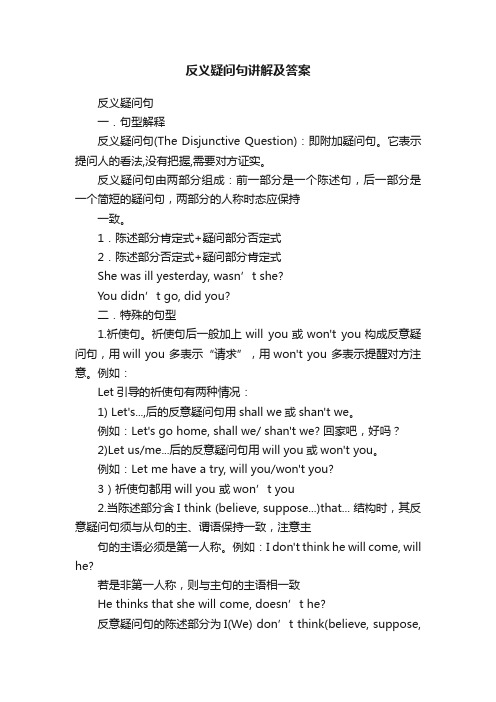
反义疑问句讲解及答案反义疑问句一.句型解释反义疑问句(The Disjunctive Question):即附加疑问句。
它表示提问人的看法,没有把握,需要对方证实。
反义疑问句由两部分组成:前一部分是一个陈述句,后一部分是一个简短的疑问句,两部分的人称时态应保持一致。
1.陈述部分肯定式+疑问部分否定式2.陈述部分否定式+疑问部分肯定式She was ill yesterday, wasn’t she?You didn’t go, did you?二.特殊的句型1.祈使句。
祈使句后一般加上will you或won't you构成反意疑问句,用will you 多表示“请求”,用won't you 多表示提醒对方注意。
例如:Let引导的祈使句有两种情况:1) Let's...,后的反意疑问句用shall we或shan't we。
例如:Let's go home, shall we/ shan't we? 回家吧,好吗?2)Let us/me...后的反意疑问句用will you或won't you。
例如:Let me have a try, will you/won't you?3)祈使句都用will you 或won’t you2.当陈述部分含I think (believe, suppose...)that... 结构时,其反意疑问句须与从句的主、谓语保持一致,注意主句的主语必须是第一人称。
例如:I don't think he will come, will he?若是非第一人称,则与主句的主语相一致He thinks that she will come, doesn’t he?反意疑问句的陈述部分为I(We) don’t think(believe, suppose,consider)+ that从句时,从句为否定意义,问句部分的动词和主语仍与that从句保持一致且用肯定式。
高中英语语法:反义疑问句专项讲解(含答案)
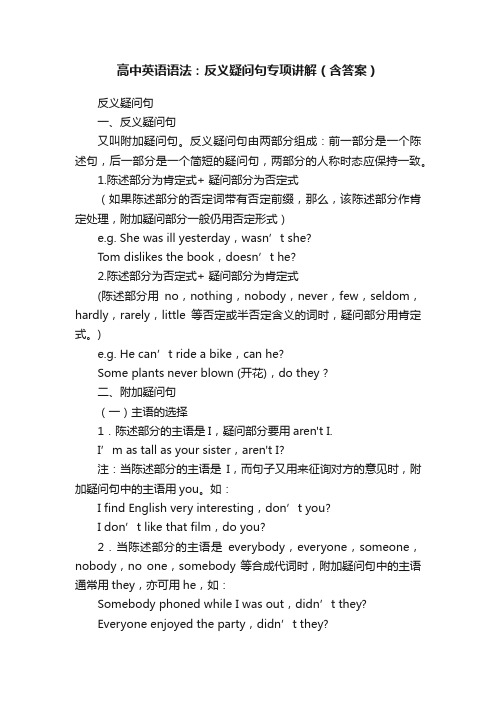
高中英语语法:反义疑问句专项讲解(含答案)反义疑问句一、反义疑问句又叫附加疑问句。
反义疑问句由两部分组成:前一部分是一个陈述句,后一部分是一个简短的疑问句,两部分的人称时态应保持一致。
1.陈述部分为肯定式+ 疑问部分为否定式(如果陈述部分的否定词带有否定前缀,那么,该陈述部分作肯定处理,附加疑问部分一般仍用否定形式)e.g. She was ill yesterday,wasn’t she?Tom dislikes the book,doesn’t he?2.陈述部分为否定式+ 疑问部分为肯定式(陈述部分用no,nothing,nobody,never,few,seldom,hardly,rarely,little等否定或半否定含义的词时,疑问部分用肯定式。
)e.g. He can’t ride a bike,can he?Some plants never blown (开花),do they ?二、附加疑问句(一)主语的选择1.陈述部分的主语是I,疑问部分要用aren't I.I’m as tall as your sister,aren't I?注:当陈述部分的主语是I,而句子又用来征询对方的意见时,附加疑问句中的主语用you。
如:I find English very interesting,don’t you?I don’t like that film,do you?2.当陈述部分的主语是everybody,everyone,someone,nobody,no one,somebody 等合成代词时,附加疑问句中的主语通常用they,亦可用he,如:Somebody phoned while I was out,didn’t they?Everyone enjoyed the party,didn’t they?Nobody wants to go there,does he?3.当陈述部分的主语是不定代词everything,nothing,anything,something时,附加疑问句中的主语一般用it,如:Everything seems all right now,d oesn’t it?Nothing is kept in good order,is it?Something must be done to stop pollution,isn’t it?4.当陈述部分的主语是指示代词this,that或these,those时,附加疑问句中的主语分别用it和they,如:This is important,isn’t it?That isn’t correct,is it?These are your friends Tom and Jack,aren’t they?5.如果陈述部分是以代词one作主语,附加疑问句中的主语在正式场合用one,非正式场合下可以用you或he,如:One can’t be too careful,can one?或can you?One should do his duty,shouldn’t he?6.当陈述句为there be结构时,附加疑问句中的主语也用there。
(完整版)英语反义疑问句的问句与回答归纳

英语反义疑问句用法讲解一、基本概念及结构:反义疑问句又叫附加疑问句,是指当提问的人对前面所叙述的事实不敢肯定,而需要向对方加以证实时所提出的问句。
其结构为:前一部分是一个陈述句,后一部分是一个简短的问句。
完成后一部分简短问句时,要根据前面陈述句的动词时态和人称来选择适当的助动词进行提问,前后两部分的人称和动词时态要保持一致。
如果前一部分用肯定式,后一部分一般用否定式;反之,前一部分为否定式,后一部分要用肯定式,即“前肯定后否定,前否定后肯定”。
例如:You don’t like rock music, do you? 你不喜欢摇滚乐,对吧?二、反义疑问句的回答不管是前否后肯,还是前肯后否形式的反义疑问句,回答都根据事实回答,肯定的答案就用yes+肯定结构,否定的答案就用no+否定结构,答案要和实际情况相符。
也叫实事求是例如:1、--She is good at English, isn't she?--Yes, she is. 是的,她擅长或者No, she isn't.不,她不擅长2、--There isn't a computer in you r room, is there?“你的房间里没有电脑,对吗? -- Yes, there is.不,有电脑或者 No,there isn't.是的,没有电脑。
三、其他规则:1、陈述部分用否定词或半否定词 no , nothing, nobody, never, few, seldom, hardly, rarely, little 等否定含义的词时,疑问部分用肯定形式。
例如:He is never late for school, is he?他上学从不迟到,是吗?2、陈述部分的谓语是used to 时,疑问部分用didn’t +主语或 usedn’t +主语。
例如:He used to take pictures there, didn’t / usedn’t he? 他过去常常在那儿拍照,是吗?You used to sleep with the windows open, usedn’t/ didn’t you?你过去常常开着窗户睡觉,是吗?3、陈述部分为祈使句时,祈使句后加附加问句,不表示反意,而表示一种语气。
反义疑问句详细讲解及习题及答案精编版

反义疑问句详细讲解及习题及答案文件编码(008-TTIG-UTITD-GKBTT-PUUTI-WYTUI-8256)反义疑问句一.句型解释反义疑问句(The Disjunctive Question):即附加疑问句。
它表示提问人的看法,没有把握,需要对方证实。
反义疑问句由两部分组成:前一部分是一个陈述句,后一部分是一个简短的疑问句,两部分的人称时态应保持一致。
1.陈述部分肯定式+疑问部分否定式2.陈述部分否定式+疑问部分肯定式She was ill yesterday, wasn’t sheYou didn’t go, did you二.特殊的句型1.祈使句。
祈使句后一般加上will you或won't you构成反意疑问句,用will you 多表示“请求”,用won't you 多表示提醒对方注意。
例如:Let引导的祈使句有两种情况:1) Let's...,后的反意疑问句用shall we或shan't we。
例如:Let's go home, shall we/ shan't we 回家吧,好吗2)Let us/me...后的反意疑问句用will you或won't you。
例如:Let me have a try, will you/won't you3)祈使句都用will you 或won’t you2.当陈述部分含I think (believe, suppose...)that... 结构时,其反意疑问句须与从句的主、谓语保持一致,注意主句的主语必须是第一人称。
例如: I don't think he will come, will he若是非第一人称,则与主句的主语相一致He thinks that she will come, doesn’t he反意疑问句的陈述部分为I(We) don’t think(believe, suppose, consider)+ that从句时,从句为否定意义,问句部分的动词和主语仍与that从句保持一致且用肯定式。
(完整版)初中英语反义疑问句讲解_练习及答案
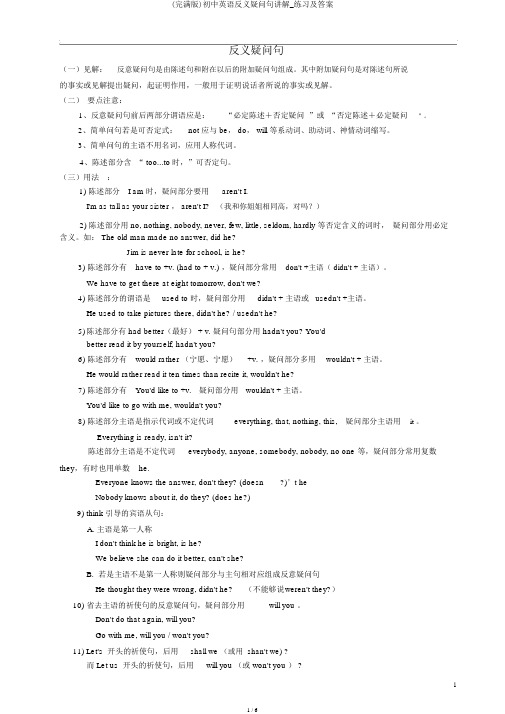
反义疑问句(一)见解:反意疑问句是由陈述句和附在以后的附加疑问句组成。
其中附加疑问句是对陈述句所说的事实或见解提出疑问,起证明作用,一般用于证明说话者所说的事实或见解。
(二)要点注意:1、反意疑问句前后两部分谓语应是:“必定陈述+否定疑问”或“否定陈述+必定疑问”。
2、简单问句若是可否定式:not 应与 be, do, will 等系动词、助动词、神情动词缩写。
3、简单问句的主语不用名词,应用人称代词。
4、陈述部分含“ too...to时,”可否定句。
(三)用法:1) 陈述部分I am 时,疑问部分要用aren't I.I'm as tall as your sister , aren't I?(我和你姐姐相同高,对吗?)2) 陈述部分用 no, nothing, nobody, never, few, little, seldom, hardly 等否定含义的词时,疑问部分用必定含义。
如: The old man made no answer, did he?Jim is never late for school, is he?3) 陈述部分有have to +v. (had to + v.) ,疑问部分常用don't +主语( didn't + 主语)。
We have to get there at eight tomorrow, don't we?4) 陈述部分的谓语是used to 时,疑问部分用didn't + 主语或usedn't +主语。
He used to take pictures there, didn't he? / usedn't he?5)陈述部分有 had better(最好) + v. 疑问句部分用 hadn't you? You'dbetter read it by yourself, hadn't you?6) 陈述部分有would rather (宁愿、宁愿)+v. ,疑问部分多用wouldn't + 主语。
(完整)反义疑问句讲解和练习(答案)
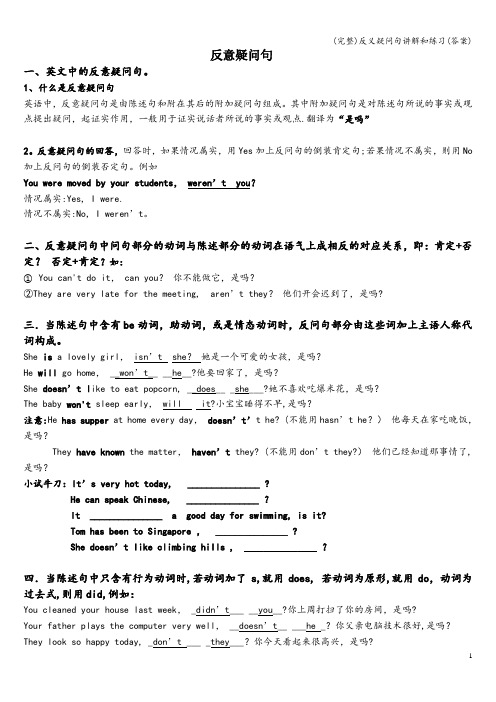
反意疑问句一、英文中的反意疑问句。
1、什么是反意疑问句英语中,反意疑问句是由陈述句和附在其后的附加疑问句组成。
其中附加疑问句是对陈述句所说的事实或观点提出疑问,起证实作用,一般用于证实说话者所说的事实或观点.翻译为“是吗”2。
反意疑问句的回答,回答时,如果情况属实,用Yes加上反问句的倒装肯定句;若果情况不属实,则用No 加上反问句的倒装否定句。
例如You were moved by your students,weren’t you?情况属实:Yes, I were.情况不属实:No, I weren’t。
二、反意疑问句中问句部分的动词与陈述部分的动词在语气上成相反的对应关系,即:肯定+否定?否定+肯定?如:①You can't do it, can you?你不能做它,是吗?②They are very late for the meeting, aren’t they?他们开会迟到了,是吗?三.当陈述句中含有be动词,助动词,或是情态动词时,反问句部分由这些词加上主语人称代词构成。
She is a lovely girl,isn’t she?她是一个可爱的女孩,是吗?He will go home, __won’t__ __he__?他要回家了,是吗?She doesn’t l ike to eat popcorn, __does__ _she___?她不喜欢吃爆米花,是吗?The baby won't sleep early, will it?小宝宝睡得不早,是吗?注意:He has supper at home every day,doesn’t’t he? (不能用hasn’t he?)他每天在家吃晚饭,是吗?They have known the matter,haven’t they? (不能用don’t they?)他们已经知道那事情了,是吗?小试牛刀:It’s very hot today, _______________ ?He can speak Chinese, _______________ ?It _______________ a good day for swimming, is it?Tom has been to Singapore , _______________ ?She do esn’t like climbing hills , _______________ ?四.当陈述句中只含有行为动词时,若动词加了s,就用does, 若动词为原形,就用do,动词为过去式,则用did,例如:You cleaned your house last week, _didn’t___ __you__?你上周打扫了你的房间,是吗?Your father plays the computer very well, __doesn’t__ ___he _?你父亲电脑技术很好,是吗?They look so happy today, _don’t ___ _they___?你今天看起来很高兴,是吗?小试牛刀: Meimei studies in a middle school, _______________ ?He loves cold weather , _______________ ?You finished the task yesterday, _______________ ?五.反意疑问句的陈述部分带有little, few, never, hardly, seldom,nobody, nothing,barely, scarcely等否定意义的词时,问句部分用肯定式.如:①She never tells a lie, does she?(不用doesn’t she?)她从不说谎,是吗?②He was seldom late, was he?(不用wasn’t he?) 他几乎不迟到,是吗?小试牛刀:Few students can answer the question, _______________ ?He can hardly finish his homework, _______________ ?六、反意疑问句的陈述部分为I am……时,问句部分习惯上用aren’t I?表示.如:I am a very honest man, aren’t I? 我是个很诚实的人,是吗?小试牛刀:I’m in Class 3,Grade 2, _______________ ?I’m ten years old, _______________ ?七.陈述部分的主语为不定代词something, anything, nothing, everything时,问句部分的主语用it。
(完整版)反义疑问句详细讲解及习题及答案
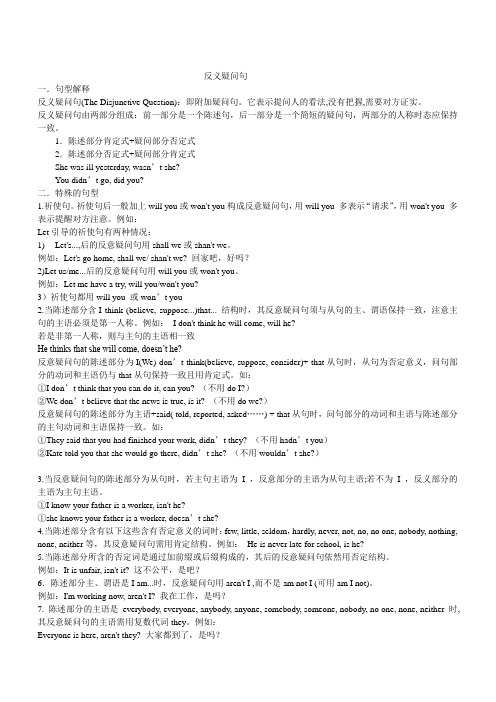
反义疑问句一.句型解释反义疑问句(The Disjunctive Question):即附加疑问句。
它表示提问人的看法,没有把握,需要对方证实。
反义疑问句由两部分组成:前一部分是一个陈述句,后一部分是一个简短的疑问句,两部分的人称时态应保持一致。
1.陈述部分肯定式+疑问部分否定式2.陈述部分否定式+疑问部分肯定式She was ill yesterday, wasn’t she?You didn’t go, did you?二.特殊的句型1.祈使句。
祈使句后一般加上will you或won't you构成反意疑问句,用will you 多表示“请求”,用won't you 多表示提醒对方注意。
例如:Let引导的祈使句有两种情况:1) Let's...,后的反意疑问句用shall we或shan't we。
例如:Let's go home, shall we/ shan't we? 回家吧,好吗?2)Let us/me...后的反意疑问句用will you或won't you。
例如:Let me have a try, will you/won't you?3)祈使句都用will you 或won’t you2.当陈述部分含I think (believe, suppose...)that... 结构时,其反意疑问句须与从句的主、谓语保持一致,注意主句的主语必须是第一人称。
例如:I don't think he will come, will he?若是非第一人称,则与主句的主语相一致He thinks that she will come, doesn’t he?反意疑问句的陈述部分为I(We) don’t think(believe, suppose, consider)+ that从句时,从句为否定意义,问句部分的动词和主语仍与that从句保持一致且用肯定式。
(完整版)广东中考英语专项--反义疑问句语法讲解及练习(含答案)

(完整版)广东中考英语专项--反义疑问句语法讲解及练习(含答案)一、反义疑问句的基本结构与形式反义疑问句(The DisjunctiveQuestion) 即附加疑问句,是英语四大问句之一。
它表示提问人的看法,没有把握,需要对方证实。
句尾升调表示疑问,降调表示反问。
反意疑问句,由一个陈述句加上一个短问句而构成,基本构成形式是:陈述句+动词(肯定或否定)+主语?如:①She often has lunch at school, doesn’t she?②You don’t like sports, do you?反意疑问句通常对应规则:一)、反意疑问句中问句部分的动词与陈述部分的动词在语气上成相反的对应关系,即:)肯定+否定?否定+肯定?如:①You can’t do it, can you?②They are very late for the meeting, aren’t they?二)、反意疑问句中问句部分的动词与陈述部分的动词种类要对应一致。
如:①He has supper at home every day, doesn’t he? (不能用hasn’t he?)②They have known the matter, haven’t they? (不能用don’t they?)三)、反意疑问句中问句部分的动词在时态上应和陈述部分的时态一致。
如:①They will go to town soon, won’t they?(不能用don’t they?或aren’t they?)②He works very hard, doesn’t he?(不能用didn’t he?或won’t he?)基础练习1. You are an actor, ________ _____ ?2. He is a good boy, ________ ______ ?3. It was fine yesterday, _______ ___ ?4. You were studying when I called you last night, __________ _____ ?5. She is going to visit me, _____ ____?6. I am Chinese, ______ ____?7. It often rains here, ________ ___ ?8. He likes soccer, _________ ____ ?9. You have a headache, _______ ___ ?10. I called you yesterday, _______ __?11. You will go to America, ______ ___ ?12. We have ever been to Shanghai, _________ ______ ?13.His mother is a doctor, ______ ____ ?14. The dogs are fighting, _______ _____?15 There is a boy in our classroom, _______ _______ ?17. There were many cars in the street,_________ ________ ?18. There will be robots in our families,________ ______ ?19. Sit down please, _______________ ?20. Please call me, _________________?21. Let’s go home,_________ ?22. Let us go home, ________________ ?23 . Let me see, __________________ ?答案1.aren't you 2.isn't he 3.wasn't it 4.didn't you 5.won't she 6.aren't 7.doesn't it 8.doesn't he9.don't you 10.didn't you 11.won't you 12.haven't we 13.isn't she 14.aren't they 15.isn't there 17.weren't there 18.won't there19.will you 20.will you 21.shall we22.will you 23.will you二、反义疑问句的回答反义疑问句的回答始终遵从事实,事实是肯定用Yes+肯定句,事实是否定用no+否定句,如事实是你喜欢英语:You like English,don't you? Yes,I do.(是的,我喜欢。
- 1、下载文档前请自行甄别文档内容的完整性,平台不提供额外的编辑、内容补充、找答案等附加服务。
- 2、"仅部分预览"的文档,不可在线预览部分如存在完整性等问题,可反馈申请退款(可完整预览的文档不适用该条件!)。
- 3、如文档侵犯您的权益,请联系客服反馈,我们会尽快为您处理(人工客服工作时间:9:00-18:30)。
反义疑问句一.句型解释反义疑问句(The Disjunctive Question):即附加疑问句。
它表示提问人的看法,没有把握,需要对方证实。
反义疑问句由两部分组成:前一部分是一个陈述句,后一部分是一个简短的疑问句,两部分的人称时态应保持一致。
1.陈述部分肯定式+疑问部分否定式2.陈述部分否定式+疑问部分肯定式She was ill yesterday, wasn’t she?You didn’t go, did you?二.特殊的句型1.祈使句。
祈使句后一般加上will you或won't you构成反意疑问句,用will you 多表示“请求”,用won't you 多表示提醒对方注意。
例如:Let引导的祈使句有两种情况:1) Let's...,后的反意疑问句用shall we或shan't we。
例如:Let's go home, shall we/ shan't we? 回家吧,好吗?2)Let us/me...后的反意疑问句用will you或won't you。
例如:Let me have a try, will you/won't you?3)祈使句都用will you 或won’t you2.当陈述部分含I think (believe, suppose...)that... 结构时,其反意疑问句须与从句的主、谓语保持一致,注意主句的主语必须是第一人称。
例如:I don't think he will come, will he?若是非第一人称,则与主句的主语相一致He thinks that she will come, doesn’t he?反意疑问句的陈述部分为I(We) don’t think(believe, suppose, consider)+ that从句时,从句为否定意义,问句部分的动词和主语仍与that从句保持一致且用肯定式。
如:①I don’t think that you can do it, can you? (不用do I?)②We don’t believe that the news is true, is it? (不用do we?)反意疑问句的陈述部分为主语+said( told, reported, asked……) + that从句时,问句部分的动词和主语与陈述部分的主句动词和主语保持一致。
如:①They said that you had finished your work, didn’t they? (不用hadn’t you)②Kate told you that she would go there, didn’t she? (不用wouldn’t she?)3.当反意疑问句的陈述部分为从句时,若主句主语为I ,反意部分的主语为从句主语;若不为I ,反义部分的主语为主句主语。
①I know your father is a worker, isn't he?①she knows your father is a worker, doesn’t she?4.当陈述部分含有以下这些含有否定意义的词时:few, little, seldom,hardly, never, not, no, no one, nobody, nothing, none, neither等,其反意疑问句需用肯定结构。
例如:He is never late for school, is he?5.当陈述部分所含的否定词是通过加前缀或后缀构成的,其后的反意疑问句依然用否定结构。
例如:It is unfair, isn't it? 这不公平,是吧?6.陈述部分主、谓语是I am...时,反意疑问句用aren't I ,而不是am not I (可用am I not)。
例如:I'm working now, aren't I? 我在工作,是吗?7. 陈述部分的主语是everybody, everyone, anybody, anyone, somebody, someone, nobody, no one, none, neither 时, 其反意疑问句的主语需用复数代词they。
例如:Everyone is here, aren't they? 大家都到了,是吗?No one knows about it, do they? 没有人知道这件事,对吗?8.陈述部分的主语是everything, nothing, anything或something 时,反意疑问句的主语应用代词it。
例如:Something is wrong with my radio, isn't it?我的收音机出毛病了,是吧?9.陈述部分的主语是指示代词this或that时,反意疑问句的主语用it,当陈述部分的主语是指示代词these或those 时,其反意疑问句的主语用they。
例如:This is a plane, isn't it? 这是一架飞机,是吗?These are grapes,aren't they? 这些是葡萄,是吗?10.陈述部分的主语是不定代词one时,反意疑问句的主语可以用one,也可用you。
例如:One should be ready to help others, shouldn't one?每个人都应该乐于助人,是吧?11. 当陈述部分谓语动词是need, dare,且这些词被用作实义动词时,其反意疑问句需用do的适当形式。
例如:He needs help, doesn't he?他需要帮助,是吗?12.当陈述部分主语是从句、不定式(短语)、动词-ing形式时,反意疑问句的主语应该用it。
例如:What you need is more important, isn't it?你需要的东西更重要,是吧?12.have(has)不是表示“有”的意思,并在句中做谓语时,其反意疑问句的助动词要用do, does, did。
例如:They had a meeting just now,didn't they?他们刚才开了个会,是吗?15.陈述部分有have to 时,其反意疑问句要用助动词的否定形式。
例如:You have to water the vegetables every day, don't you?You had to water the vegetables every day, didn't you?16.He used to stay up late, usedn’t he/ didn’t he?17.陈述部分是there be句型时,其反意疑问句中要用there。
There was a hospital here, wasn't there?18.陈述部分有had better时,反意疑问句中要用hadn't。
例如:We’d better go to school at once, hadn't we?He’d rather go home, wouldn’t he?19.当陈述部分含有情态动词must时,我们便要分析一下must的含义。
如果must 作“一定;要;必须”讲,反意疑问句须用mustn't或needn't;而当must作推测意义“一定是;必定”讲时,反意疑问句则需根据must 后的动词原形选用相应的形式。
例如:He must work hard at physics, mustn't he?他必须努力学物理,是吧?Tom must be at home,isn't he? 汤姆一定在家,是吧①He might have forgotten his pen in the classroom yesterday, didn’t he?(不用mightn’t he?/ hasn’t he?)②You must have got up late this morning, didn’t you?(不用mustn’t you?/haven’t you?)20.反意疑问句的回答用yes,no,但是,回答意思相反,当陈述部分是否定形式时,回答要按事实。
例如:They don’t work hard, do they?Yes, they do. 不,他们工作努力。
/No, they don’t. 对,他们工作不努力。
反意疑问句的陈述部分为I am……时,问句部分习惯上用aren’t I?表示。
如:I am a very honest man, aren’t I?反意疑问句练习1. I suppose the shoes will last you at least one year, ____________?A. won’t theyB. will theyC. do ID. don’t2. Everyone is surprised at the news, _____________?A, is he B. are they C. aren’t they D. is not he3. ----- You will come to have dinner with us, won’t you?----- ____________A. Excuse me, I won’t.B. I haven’t been there.C. You are welcome.D. Yes. That’s ve ry nice of you.4. Tom isn’t a hard-working student, for it is the third time he has been late, ______________?A. wasn’t itB. hasn’t itC. isn’t itD. hasn’t he5. You don’t have to go school on Sundays, _____________ you?A. haveB. doC. shouldD. would6. I don’t think he had his supper at the school, _____________?A. had heB. did heC. do ID. don’t you7.I don’t think he’d like to take such a difficult job, __________?A. had heB. would heC. do ID. don’t you8. I don’t think her passport’s gone, __________?A. is itB. has sheC. do ID. don’t you9. Do pay attention to my work and keep your eyes open all the time, ____________?A. will youB. don’t youC. shall weD. won’t we10. All the drivers dislike driving on the narrow roads ________________?A. don’t theyB. don’t each of themC. do ID. don’t you11. Let’s go and have a walk,___________?A. doB. shallC. haven’tD. shan’t12. Go and fetch a chair for him, ___________?A. don’t youB. shall youC. won’t youD. will you13. There used to be a shop behind the factory, ________________?A. didn’t thereB. used thereC. usedn’t it C. didn’t it14. I’m sure he must have been sleeping at the moment, __________?A. aren’t I B, mustn’t C. wasn’t he D. hasn’t15. I had to tell the truth, __________?A. hadn’t IB. wouldn’t IC. didn’t ID. shouldn’t I16.------- Why is Tom absent now ?-------He must be sick,________________?A. isn’t heB. must heC. is heD. mustn’t he17, He’d like to have a look at your picture,_________-he ?A. hadn’tB. didn’t C .couldn’t D .wouldn’t18. You don’t think he will come,_________?A. do youB. will youC. will heD. won’t he19. Let’s go home, shall we? _________.A. That’s right.B. That’s allC. That’s all rightD. All right20. Jack had dinner with his mother at home yesterday,A. didB. doesC. didn’tD. hadn’t21. Let John finish the work all by himself,___________?A. shall weB. will youC. do youD. do we22.I don’t think it is going to rain, _____________ it?A. do IB. do youC. isD. isn’t23. Nothing the boy did was right, _______ it?A. wasB. didC. wasn’t C. didn’t24. It’s the first time that she has been to the United States, ____________?A. isn’t sheB. isn’t itC. hasn’t sheD. hasn’t it25. He was hardly able to stand on his feet after the car accident,__________ he?A. couldB. couldn’tC. wasD. wasn’t26. Jack seldom goes to the park, _______________?A. does heB. doesn’t heC. does JackD. doesn’t Jack27. People use tag question (反意疑问) because they are not sure of what they have said _____________they?A. doB. didC. didn’tD. don’t28. Everyone wants to be chosen for the work, ____________?A. isn’t heB. does heC. don’t theyD. do they29. She is going to see you ,_________ she ?A. isn’tB. isC. don’tD. doesn’t30. They used to live in these mountain areas ,_____________ they?A. didB. didn’tC. usedD. weren’t31. He ought to go by plane, _____he ?A. shouldn’tB. wouldn’tC. shouldD. would32. Lovely weather! ___________?A. Yes. You are right.B. Yes ,isn’t itC. No, it isD. No, you are wrong33. ---------- You must do as I tell you.----------Oh, I must, ____________I?A. shouldB. mustn’tC. oughtD. must34. We must start earlier,__________ we?A. needn’tB. mustn’tC. don’tD. mustn’t35. You must have studied English for many years, _________ you?A. didn’tB. haven’tC. needn’tD. mustn’t36. She must have arrived there yesterday, __________ she ?A. didn’tB. hasn’tC. needn’tD. mustn’t37. We mustn’t be late, __________ we?A. mustB. mayC. areD. A&B38, I needn’t show her the keys to the question, ________ I?A. mustB. needC. canD. do39. We need to practice speaking English more often, ___________ we?A. mustn’tB. needn’tC. can’tD. don’t40. I have to work this afternoon,__________ I? A. don’t C, haven’t D. doKEY. 1--10 ACDCB BBAAA 11-20 BDACC ADADC21-30 BCABC ADCAB 31-40 ABDAB ADBDC。
